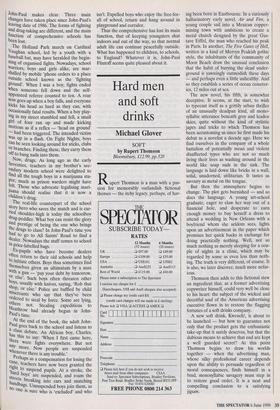Hard men and soft drinks
Michael Glover
SOFT by Rupert Thomson Bloomsbury, £12.99, pp.320 Rupert Thomson is a man with a pas- sion for memorably outlandish fictional themes — the itchy legacy, perhaps, of hay- ing been born in Eastbourne. In a curiously hallucinatory early novel, Air and Fire, a young couple sail into a Mexican copper- mining town with ambitions to create a metal church designed by the great Gus- tave Eiffel, the man who reached his peak in Paris. In another, The Five Gates of Hell, written in a kind of Mervyn Pealdsh gothic style, the inhabitants of the community of Moon Beach draw the unusual conclusion that the habit of burying the dead under- ground is yawningly outmodish these days — and perhaps even a little unhealthy. And so they establish a series of ocean cemeter- ies, 12 miles out at sea.
The new novel, his fifth, is somewhat deceptive. It seems, at the start, to wish to typecast itself as a grittily urban thriller of an unusually deadpan kind, all mono- syllabic utterance beneath grey and leaden skies, quite without the kind of stylistic japes and tricks to which Thomson has been accustoming us since he first made his debut as a novelist a decade ago. Here we find ourselves in the company of a whole battalion of potentially mean and violent disaffected types who are riot so much living their lives as washing around in the world like soap suds in the sink. The language is laid down like bricks in a wall, solid, unadorned, utilitarian. It tastes as savoury as metal on the tongue.
But then the atmosphere begins to change. The plot gets burnished — and so does the language. A young art-school graduate, eager to claw her way out of a financial hole, and desperate to earn enough money to buy herself a dress to attend a wedding in New Orleans with a boyfriend whom she seldom sees, lights upon an advertisement in the paper which promises her quick bucks in exchange for doing practically nothing. Well, not so much nothing as merely sleeping for a cou- ple of nights in a clinic, which may be regarded by some as even less than noth- ing. The truth is very different, of course. It is also, we later discover, much more nefar- ious.
Thomson then adds to this fictional stew an ingredient that, as a former advertising copywriter himself, could very well be close to his heart: the subject of the wicked and deceitful soul of the American advertising executive flown in to restore the flagging fortunes of a soft drinks company.
A new soft drink, Kwench!, is about to be launched — but how to guarantee not only that the product gets the enthusiastic take-up that it surely deserves, but that the dubious means to achieve that end are kept a well guarded secret? At this point Thomson begins to draw his worlds together — when the advertising man, whose silky profesgional career depends upon the ability to persuade regardless of moral consequences, finds himself in a bind, monosyllabic savagery must step in to restore good order. It is a neat and compelling conclusion to a satisfying jigsaw.


























































 Previous page
Previous page